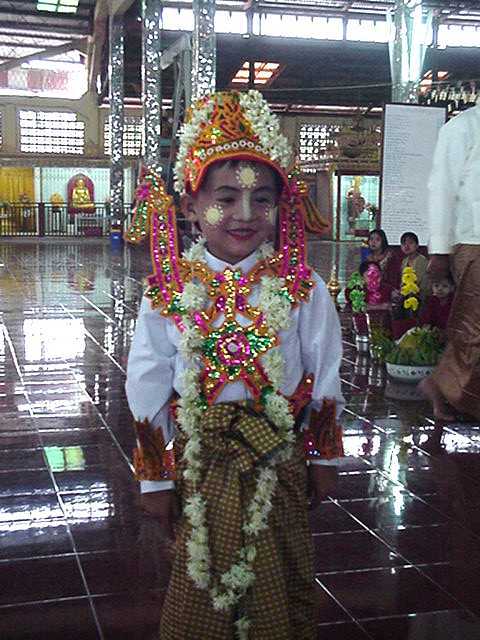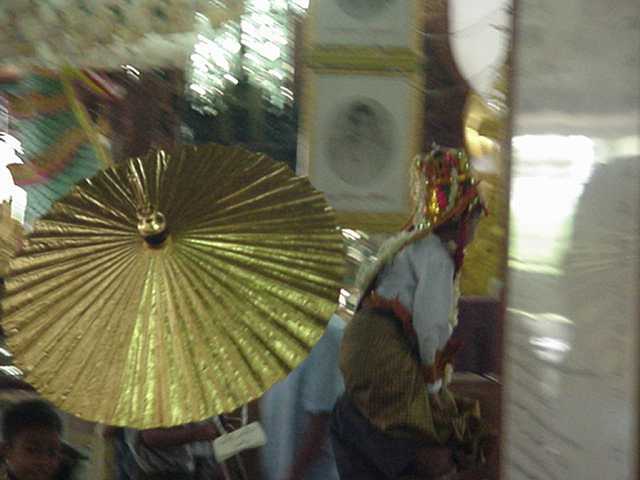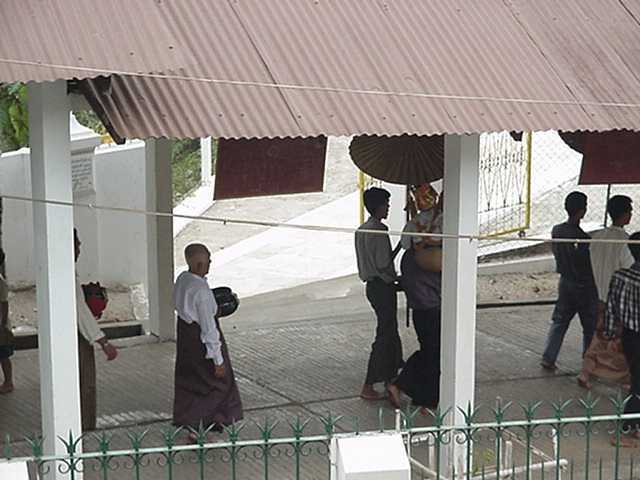Ngahtatgyi
Paya
 South
of the Chaukhtatgyi Paya lies the Ngahtatgyi Paya, located in the Ashay
Tawya monastery. The centerpiece of the temple is the magnificent five
storey high Buddha, shown in the photo to the left.
South
of the Chaukhtatgyi Paya lies the Ngahtatgyi Paya, located in the Ashay
Tawya monastery. The centerpiece of the temple is the magnificent five
storey high Buddha, shown in the photo to the left.  The
day we visited the monastery was an auspicious one, as we were able to
observe the initiation of several young boys as novice monks. The ceremony
inducts boys from 5 to 15, and is called the shinpyu ceremony. Most
boys participate in this first entry into monastic life (a more permanent
state of monasticism, pongyi, is entered into by fully ordained
monks sometime after the age of 20). The photo to the right shows an excited
young samanera or novitiate, at the start of the shinpyu ceremony.
The
day we visited the monastery was an auspicious one, as we were able to
observe the initiation of several young boys as novice monks. The ceremony
inducts boys from 5 to 15, and is called the shinpyu ceremony. Most
boys participate in this first entry into monastic life (a more permanent
state of monasticism, pongyi, is entered into by fully ordained
monks sometime after the age of 20). The photo to the right shows an excited
young samanera or novitiate, at the start of the shinpyu ceremony.

 The shinpyu ceremony is a common event, as a family earns great
merit when a son forsakes
his childhood life and dons the robe of the monk. Henceforth, he will have
no possessions, save the bowl with which he begs his meals. Few novices
remain in the order long enough to take their ordained vows, but clearly
the initiation of the novice is cause for a huge celebration. As you can
see from the eager participant to the left, the monk-to-be is bedecked
in finery. After offering prayers and agreeing to the 10 precepts or vows,
the novice is carried several times in a grand procession around the perimeter
of the temple, as shown in the photo to the right. Following this, he is
whisked off to the nearby monastery
to begin his training. (below, right) The young monks pictured a the Chaukhtatgyi
Paya were also young novitiates. The period of religious servitude is rather
short; a novice usually lasts a week or two, with nine days being considered
an auspicious number. Although our young novitiates actually stay in the
order
The shinpyu ceremony is a common event, as a family earns great
merit when a son forsakes
his childhood life and dons the robe of the monk. Henceforth, he will have
no possessions, save the bowl with which he begs his meals. Few novices
remain in the order long enough to take their ordained vows, but clearly
the initiation of the novice is cause for a huge celebration. As you can
see from the eager participant to the left, the monk-to-be is bedecked
in finery. After offering prayers and agreeing to the 10 precepts or vows,
the novice is carried several times in a grand procession around the perimeter
of the temple, as shown in the photo to the right. Following this, he is
whisked off to the nearby monastery
to begin his training. (below, right) The young monks pictured a the Chaukhtatgyi
Paya were also young novitiates. The period of religious servitude is rather
short; a novice usually lasts a week or two, with nine days being considered
an auspicious number. Although our young novitiates actually stay in the
order may be short, the active participation of most young men in the process
cements the daily bond of Buddhist beliefs and daily life, instilling him
with an appreciation of its spiritual message.
may be short, the active participation of most young men in the process
cements the daily bond of Buddhist beliefs and daily life, instilling him
with an appreciation of its spiritual message.

Return
to Yangon
Main
Page
 South
of the Chaukhtatgyi Paya lies the Ngahtatgyi Paya, located in the Ashay
Tawya monastery. The centerpiece of the temple is the magnificent five
storey high Buddha, shown in the photo to the left.
South
of the Chaukhtatgyi Paya lies the Ngahtatgyi Paya, located in the Ashay
Tawya monastery. The centerpiece of the temple is the magnificent five
storey high Buddha, shown in the photo to the left.  The
day we visited the monastery was an auspicious one, as we were able to
observe the initiation of several young boys as novice monks. The ceremony
inducts boys from 5 to 15, and is called the shinpyu ceremony. Most
boys participate in this first entry into monastic life (a more permanent
state of monasticism, pongyi, is entered into by fully ordained
monks sometime after the age of 20). The photo to the right shows an excited
young samanera or novitiate, at the start of the shinpyu ceremony.
The
day we visited the monastery was an auspicious one, as we were able to
observe the initiation of several young boys as novice monks. The ceremony
inducts boys from 5 to 15, and is called the shinpyu ceremony. Most
boys participate in this first entry into monastic life (a more permanent
state of monasticism, pongyi, is entered into by fully ordained
monks sometime after the age of 20). The photo to the right shows an excited
young samanera or novitiate, at the start of the shinpyu ceremony.



